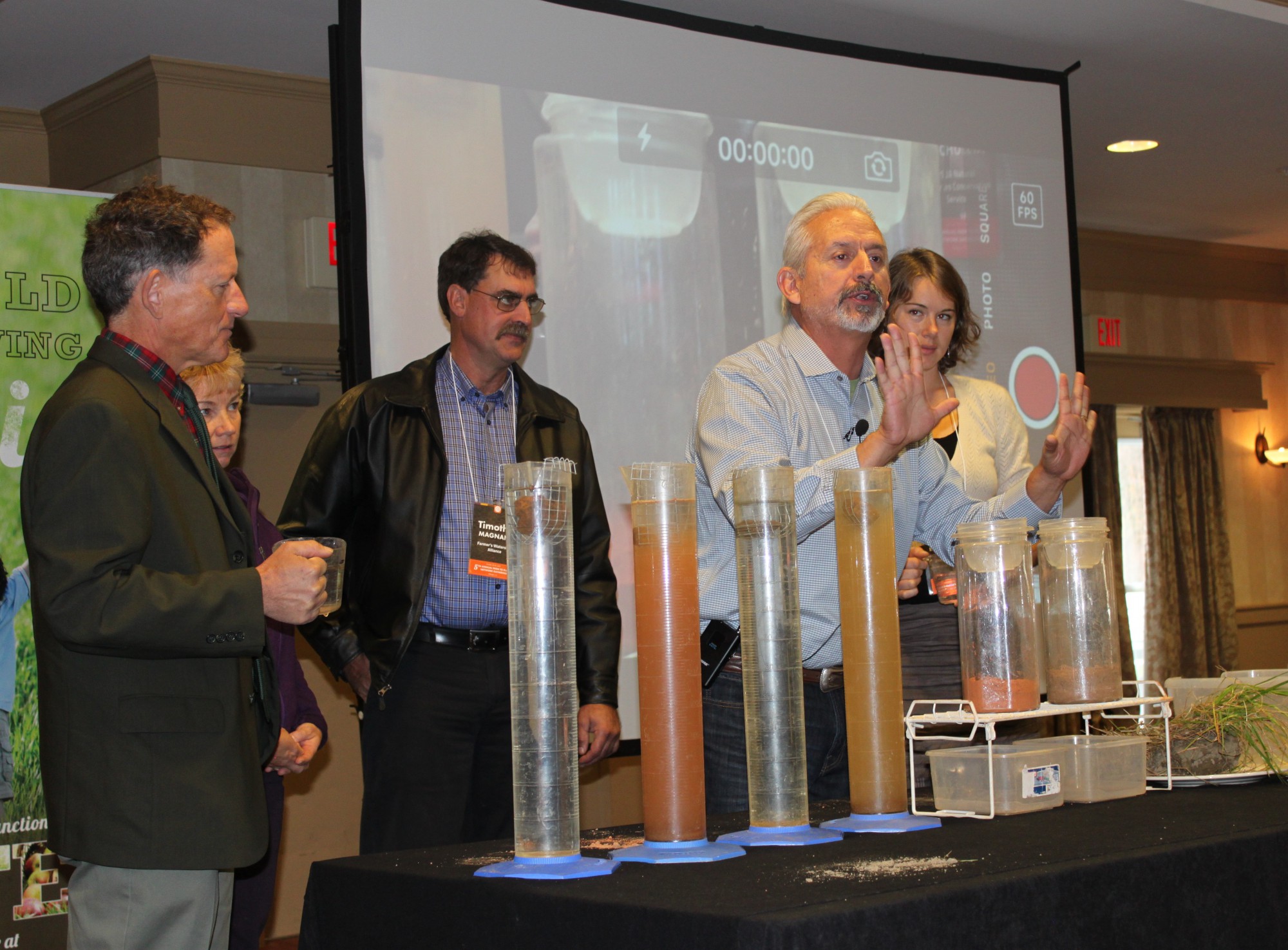Soil regeneration and clean water touted as foundation for healthy food at annual Vermont Farm to Plate Gathering
November 06, 2015

“Farm in nature’s image” was the takeaway message shared by Ray Archuleta, Conservation Agronomist at the USDA Natural Resources and Conservation Service (NRCS) and keynote speaker at the fifth annual Farm to Plate Annual Gathering. Held annually at the end of October, the Gathering is the one time each year when the entire Farm to Plate Network comes together to reflect on what has been accomplished and plan for the challenges that lie ahead implementing Vermont’s food system plan.
Archuleta engaged the 250 Farm to Plate Network members in attendance at the Killington Grand Resort with a soil stability demonstration, comparing no till versus tilled soil when immersed in water. The tilled soil rapidly came apart while the no till soil retained its form. The health of the no till soil is maintained by principles such as cover cropping, integrating a diversity of plants and animals, and reducing chemical, biological, and physical stress. Archuleta impressed upon Vermont’s farm and food sector industry leaders an understanding that the social and ecological context of the food system provides vast opportunities to cleanse the water that runs through it, grow healthy food, and provide for flood protection.
State Conservationist for the USDA Natural Resources Conservation Service (NRCS) in Vermont, Vicky Drew, introduced Archuleta by emphasizing the integral connection between soil health and water quality. “Conservation and stewardship start with how we treat our soil. Soil is not something to take for granted. It is a precious resource that must be fed and nurtured, much like we feed and nurture our children.”
Vermont’s new Clean Water Act—the most comprehensive water quality legislation in Vermont’s history—creates new regulations and devotes more resources to reduce pollution from farms, roads, and impervious surfaces. Drew reminded the audience that the USDA awarded $16 million to Vermont through the Regional Conservation Partnership Program to help address pollution in Lake Champlain. The grant was the second largest in the country and provides 26 partnering organizations, agencies, businesses, and nonprofits with the resources to provide financial and technical assistance to agricultural and forest landowners to improve water quality in the Lake Champlain Basin. USDA also recently promised that $45 million would be set aside through the NRCS EQIP program to help agricultural producers meet these challenges.
Farmer perspectives provide invaluable insights into how work is conducted to reach Vermont’s Farm to Plate food system goals. Vermont Agency of Agriculture, Food & Markets Secretary Chuck Ross moderated a healthy soil and water panel with Harvey Smith of Smith Family Farm in New Haven, Paul Harlow of Harlow Farm in Westminster, and Tim Magnant of Bridgeman View Farm in Franklin.
Non-profit organizations, government agencies, institutions, and the private sector (farmers/producers/food businesses) attend the Gathering to strengthen partnerships, build new collaborations, and learn from one another. This year’s Gathering also offered a series of breakout sessions where Network members continued system change conversations and gained greater understanding of food system issues ranging from food-related health challenges, scaling-up production, farm viability, workforce development, and increasing consumer demand.
“The Farm to Plate Annual Gathering and subsequent meetings throughout the year bring together diverse stakeholders with many different perspectives. We deliberately focus on creating a trusting, inclusive space to facilitate the tough conversations needed to create comprehensive change in our food system so that Vermont can relocalize food production and distribution. Healthy local food should be accessible to all Vermonters; provide economic viability to farmers, all types of food producers, and workers; and improve our environmental resiliency and sustainability—all of which help Vermont reach its Farm to Plate goals,” shares Jake Claro, Farm to Plate Network Manager.
###
Vermont Farm to Plate is the statewide initiative legislatively directed to increase economic development and jobs in Vermont’s farm and food sector and improve access to healthy local food for all Vermonters. Vermont’s ten year Farm to Plate food system plan to strengthen the working landscape, build the resilience of farms and food enterprises, improve environmental quality, and increase healthy, local food access for all Vermonters is being implemented by the Farm to Plate Network—over 350 farm and food sector organizations from across the state. Farm to Plate is coordinated by the Vermont Sustainable Jobs Fund, a non-profit organization based in Montpelier, Vermont. Learn more at www.VTFarmtoPlate.com.




